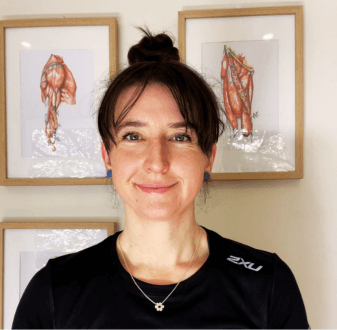Skye Meredith recently graduated from Think Education with a Bachelor of Health Science (Clinical Myotherapy) and at the Myotherapy Association Australia conference in October, she was named Emerging Myotherapist of the Year in recognition of her innovation, dedication and commitment to the Myotherapy profession. We talked to Skye about her career and her advice for others who are considering studying Myotherapy.

Skye Meredith
What made you decide to become a myotherapist?
As an ultra-runner, I often sustained injuries and I began seeing a myotherapist to treat them. That inspired me to study Myotherapy myself – I like the lens through which we view patients compared to other modalities. Myotherapy looks at the whole person rather than just treating one injury. We build a deep understanding of the individual and create a connection with them.
I graduated early in 2023 and I now practice in two clinics in Melbourne, AIM and Complete Clinic. My goal as a myotherapist is to help people continue to move and do the exercises and activities that are important to them.
What does a myotherapist do?
Myotherapy is a client-centred healthcare profession that focuses on the assessment and treatment of musculoskeletal pain and injuries. People come to us with a broad range of injuries – some have debilitating back pain, and some have sports injuries and fractures.
There is a perception that myotherapists only do hands-on treatment but that is just one aspect of our work. We use a range of modalities, such as exercise prescription and rehabilitation, dry needling, soft-tissue work and joint mobilisation, and we educate patients about their self-care.
The consultation usually begins with a chat about the patient’s injury and pain. Then in the assessment, we look at how they move. We educate the patient to help them understand their pain or injury, prescribe exercises and set goals that are specific to each person.
Myotherapy is offered as a diploma and a degree course. I studied a three-year degree, which has given me anatomical knowledge, good research skills, and the ability to use in-depth clinical reasoning in my assessment of each patient’s needs.
By the way, the ‘myo’ in ‘myotherapy’ comes from the Greek word mys, ‘muscle’.
Tell us about the Myotherapy Association Australia award
The Myotherapy Association Australia advocates for and supports myotherapists nationally. At their annual conference, they honour the Myotherapist of the Year and an outstanding recent graduate with the Emerging Myotherapist of the Year Award. I was proud to be nominated and selected as the 2023 Emerging Myotherapist in acknowledgment of my commitment, innovation and dedication.
What are the qualifications and skills requirements to become a myotherapist?
When I enrolled in the degree I hadn’t done any study since leaving high school. I worked as a pastry chef. I did, however, spend as much time as I could getting hands-on experience in elite sports doing sports massage. Once I started the course I learned everything along the way.
As well as the academic subjects you gain practical experience as you have to do 300 hours of industry placements. In the final year, you work in the Practice Wellbeing Centre in Fitzroy in Melbourne, where you treat people and receive feedback from your lecturers. This way you learn how to apply what you’ve learnt in class to help the person in front of you.
Think Education offers course credits for some subjects to remedial massage therapists and diploma-qualified myotherapists who come into the degree course.
Why did you choose to study myotherapy at Think Education?
I decided to study with Think Education because their Bachelor of Health Science in Clinical Myotherapy has an in-depth course structure and offers great opportunities for academic and hands-on learning. I wanted to be degree qualified as those three years of study give you a broad understanding of Myotherapy.
The lecturers were also a feature of the course for me. They all work in private practice, and some are involved in research as well. So I learnt a lot through the research components of the course and the experiences and real-life examples that the practitioners shared with us.
Any advice for those that want to become myotherapists?
Working as a myotherapist is incredibly rewarding. It challenges you daily and you apply all the different things you learned at uni in your practice. Personally, it's highlighted how much I love research and studying the body, especially anatomy. I never want to stop learning! I work with colleagues who are incredibly knowledgeable and always ready to discuss treatment options with me – it’s a really supportive profession.



